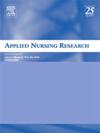镰状细胞病儿童和青少年与健康相关的生活质量:概念演变分析
IF 2.7
4区 医学
Q1 NURSING
引用次数: 0
摘要
由于缺乏可用研究,镰状细胞病(SCD)儿童和青少年的健康相关生活质量(HRQOL)概念尚未得到明确理解。本综述旨在利用罗杰斯等人(2018 年)的概念分析框架,阐明 SCD 儿童和青少年 HRQOL 的各种属性和相关概念。我们进行了系统性检索,以确定报告 SCD 儿童和青少年 HRQOL 的属性、前因、后果、替代术语和相关概念的研究。综述包括 75 篇文章,其中包括 70 项定量研究、2 项混合方法研究和 3 项定性研究。这些文章被分为 SCD 儿童和青少年 HRQOL 的属性、前因、后果、替代术语、相关概念和范例。综述确定了九个重要属性。其中包括多维和动态概念、承认疾病、保持情绪平衡和自我控制、应对疾病、疼痛管理、耻辱感和歧视、治疗负担、姑息治疗和个人复原力。前因包括对疾病的认识和态度、自我效能感、社会支持、灵性和精神健康、疾病严重程度、获得医疗保健的机会、环境因素和经济考虑。其结果是个人生活的独立性、身体健康结果的改善、心理健康、家庭和照顾者的健康、家庭、社会和同伴关系及社会交往的改善、学校成绩的提高,以及整体 HRQOL 和长期结果的改善。本分析概述了与患有 SCD 的儿童和青少年有关的 HRQOL 概念,为进一步研究护理和临床实践提供了指导。本文章由计算机程序翻译,如有差异,请以英文原文为准。
Health-related quality of life of children and adolescents with sickle cell disease: An evolutionary concept analysis
The concept of Health-Related Quality of life (HRQOL) of children and adolescents with Sickle cell disease (SCD) is not clearly understood due to the lack of available studies. This review aimed to elucidate various attributes and related concepts of HRQOL in children and adolescents with SCD using Rodgers' et al. (2018) concept analysis framework. A systematic search was performed to identify studies reporting the attributes, antecedents, consequences, surrogate terms, and related concepts of HRQOL in children and adolescents with SCD. The review included 75 articles, including 70 quantitative, two mixed-methods, and three qualitative studies. These were categorized into attributes, antecedents, consequences, surrogate terms, related concepts, and an exemplar of HRQOL in children and adolescents with SCD. The review identified nine important attributes. It includes multidimensional and dynamic concepts, acknowledging the illness, maintaining emotional balance and self-control, coping with the disease, pain management, stigma and discrimination, treatment burden, palliative care and personal resilience. The antecedents were knowledge and attitude toward the disease, self-efficacy, social support, spirituality and spiritual well-being, disease severity, access to healthcare, environmental factors, and financial considerations. The consequences were independence in personal life, improved physical health outcomes, psychological well-being, family and caregiver well-being, improved family, social and peer relationships and social interactions, improved school performance, and improved overall HRQOL and long-term outcomes. This analysis provides an overview of HRQOL concepts related to children and adolescents with SCD, guiding further research into nursing care and clinical practice.
求助全文
通过发布文献求助,成功后即可免费获取论文全文。
去求助
来源期刊

Applied Nursing Research
医学-护理
CiteScore
4.50
自引率
0.00%
发文量
65
审稿时长
70 days
期刊介绍:
Applied Nursing Research presents original, peer-reviewed research findings clearly and directly for clinical applications in all nursing specialties. Regular features include "Ask the Experts," research briefs, clinical methods, book reviews, news and announcements, and an editorial section. Applied Nursing Research covers such areas as pain management, patient education, discharge planning, nursing diagnosis, job stress in nursing, nursing influence on length of hospital stay, and nurse/physician collaboration.
 求助内容:
求助内容: 应助结果提醒方式:
应助结果提醒方式:


